Silk Stockings Blu-ray Movie
HomeSilk Stockings Blu-ray Movie 
Warner Archive CollectionWarner Bros. | 1957 | 118 min | Not rated | Jul 12, 2016
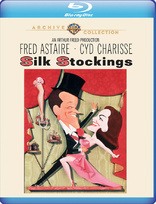
Price
List price:Amazon: $15.15 (Save 31%)
Third party: $15.15 (Save 31%)
Only 19 left in stock - order soon.
Movie rating
7.2 | / 10 |
Blu-ray rating
| Users | 0.0 | |
| Reviewer | 3.5 | |
| Overall | 3.5 |
Overview
Silk Stockings (1957)
A straitlaced Soviet agent is seduced by Paris and a high-stepping film producer.
Starring: Fred Astaire, Cyd Charisse, Janis Paige, Peter Lorre, George TobiasDirector: Rouben Mamoulian
| Romance | Uncertain |
| Musical | Uncertain |
| Comedy | Uncertain |
Specifications
Video
Video codec: MPEG-4 AVC
Video resolution: 1080p
Aspect ratio: 2.40:1
Original aspect ratio: 2.35:1
Audio
English: DTS-HD Master Audio 5.1 (48kHz, 24-bit)
Subtitles
English SDH
Discs
Blu-ray Disc
Single disc (1 BD)
Playback
Region A, B (C untested)
Review
Rating summary
| Movie | 4.0 | |
| Video | 3.5 | |
| Audio | 4.0 | |
| Extras | 2.5 | |
| Overall | 3.5 |
Silk Stockings Blu-ray Movie Review
The Divine Decadence of the West
Reviewed by Michael Reuben July 12, 2016Imagine the reaction today if a major studio announced that it was remaking Ninotchka as a
musical. The internet would erupt with derisive howls about Hollywood's creative bankruptcy.
The fact that many of the howlers might never have seen Ernst Lubitsch's 1939 classic wouldn't
lessen their fury. On contemporary movie forums, the inherent evil of remakes has achieved the
status of a categorical imperative.
Fortunately for musical fans, that wasn't the case in 1955, when a storied creative team including
playwright George S. Kaufmann and songwriter Cole Porter adapted Ninotchka into a successful
Broadway musical entitled Silk Stockings. Nor was it the case when legendary MGM producer
Arthur Freed chose to adapt Silk Stockings for the screen as the first venture of his newly formed
independent production company. The result reunited The Band Wagon co-stars Fred Astaire and
Cyd Charisse in a fluffy but elegantly staged production overseen by director Rouben
Mamoulian, in what would turn out to be the director's final film. (He was subsequently fired
from both Porgy and Bess and Cleopatra.)
Silk Stockings may not have the fizzy comic sparkle
of Lubitsch's original with Greta Garbo—few films do—but it retains its own charm, thanks in
no small part to the familiar chemistry between its two leads and the witty score by Porter, whom
Astaire persuaded to write two more songs for the film, despite the composer's longstanding
antipathy to revisiting old projects.
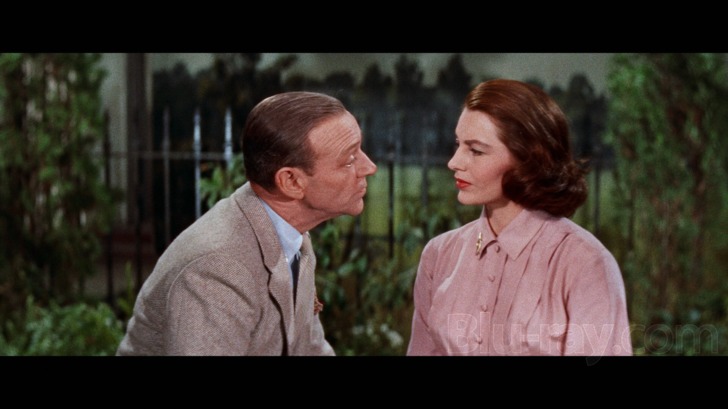
Silk Stockings updates Ninotchka's story to the Cold War, an era that presented its own challenges to having a Soviet official as a heroine. Where Lubitsch's film had to balance its parody of Stalin's Russia against the imminent likelihood of its alliance with the U.S. to fight the Nazis, Mamoulian was working in an era when the Russians were considered such a deadly threat that treating them comedically might be deemed anti-American (at least by some). Silk Stockings rises to the challenge by upping the frivolity quotient, substituting Porter's devil-may-care lyrics for the sharp jabs that Billy Wilder and Charles Brackett slyly inserted into the script for Lubitsch's film. (After Stalin's purges, jokes about state trials could no longer be funny.) Extended dance numbers fill in the sketchy plot and keep the attention focused on the skill and charm of the dancers rather than the politics of their homelands. The scheming gigolo that Melvyn Douglas played for Lubitsch has been transformed into a film producer. Whether that's a step up or a step down on the moral scale is a question everyone can decide for themselves.
Steve Canfield (Astaire) is producing a new screen adaptation of War and Peace featuring a brassy and brainless starlet, Peggy Dayton (Janis Paige), who wouldn't know the difference between Tolstoy and a samovar. Canfield has come to Paris to recruit a visiting Russian composer, Boroff (Wim Sonneveld), to write the film's musical score. Meanwhile, a trio of Soviet apparatchiks—Brankov, Bibinski and Ivanov (Peter Lorre, Jules Munshin and Joseph Buloff)—have been dispatched from Moscow to return Boroff to his homeland, but like him they are quickly seduced by the decadent Western pleasures of wine, women and song. When Moscow sends the stony and apparently incorruptible Nina "Ninotchka" Yoschenko (Charisse) to retrieve all four men, Canfield invents a delaying tactic by forging an affidavit claiming French paternity for Boroff. While the dispute over the composer's citizenship remains stalled in court, Canfield woos Ninotchka. Tours of Parisian factories and municipal facilities segue into gorgeous fashions, excursions into the city's nightlife and carefree dancing. In this version of the story, Ninotchka is a former dancer, whose rediscovery of the joys of rhythmic movement coincides with her realization that she has fallen in love with Canfield. Even the story's third-act complication, in which Ninotchka must return to Russia and Canfield has to scheme to get her back, is resolved through song and dance.
Astaire is never for a moment convincing as a Hollywood producer, but he doesn't have to be. By this point in his career, audiences came to see Fred Astaire be himself, whatever his nominal character might be (although, as it turned out, Silk Stockings would be the star's last successful musical). Charisse, who was reportedly nervous about taking a role on which Greta Garbo had put her signature stamp, makes Ninotchka a winning presence even when she's at her most severe. Beneath the Soviet uniform (which she exchanges for French silk in a sequence so close to a strip-tease that the apparatchiks of the Hays Board initially objected), Ninotchka is a classic rom-com heroine, whose head has constructed artificial barriers to love that her heart just needs time to clear away. Besides, in a big-screen musical comedy of the Fifties, nobody cared about character credibility or plot mechanics. They came to the theater, as Cole Porter's lyrics explain, for the "glorious Technicolor, breathtaking Cinemascope and stereophonic sound". Silk Stockings has all that, and more.
Silk Stockings Blu-ray Movie, Video Quality 
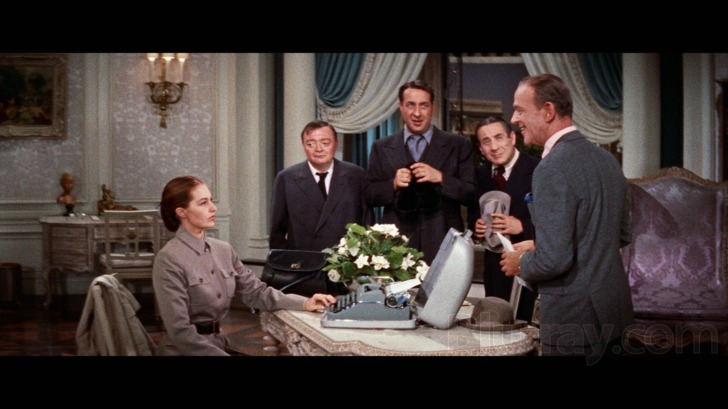
Director Rouben Moumalian famously hated the Cinemascope format, calling it "the worst shape
ever devised", but as Cole Porter's lyrics suggest, the wide frame was an essential element in the
studios' efforts to lure 1950s audiences away from their TV screens and back to the movies. Silk
Stockings' widescreen images were captured by Robert J. Bronner (Jailhouse Rock). Previous
video transfers for DVD and HD broadcast have been derived from an interpositive that the
Warner Archive Collection examined and found inadequate for Blu-ray. Accordingly, WAC
commissioned a fresh scan of the film's original camera negative, a demanding effort due to both
the age of the element and the fragile nature of Eastmancolor stock from that era. As per
Warner's current policy when dealing with an OCN, the negative was scanned at 4K.
Now, before anyone gets too excited about a 4K scan of the negative, there are inherent
limitations to the source that WAC has been unable to overcome. First of all, early anamorphic
lenses were notorious for softening the image, and that phenomenon is in full evidence on
WAC's 1080p, AVC-encoded Blu-ray of Silk Stockings. Even in closeups, the image is
disappointingly soft. Anyone expecting the kind of sharply detailed photography that appears in,
e.g., The Unsinkable
Molly Brown, which was shot seven years later, will be disappointed. But
the transfer of Silk Stockings labors under the additional burden that the film was shot on a
problematic Eastmancolor stock used from 1956 through (roughly) 1959 that suffers from a form of
deterioration called "yellow layer collapse". This degeneration adversely affects both color and
grain texture. Extensive digital color correction has (mostly) addressed the former on this
transfer, and indeed color is the Blu-ray's chief virtue. Janis Paige's assertive costumes shine
brightly, as befits her brassy character. The subtler hues of Cyd Charisse's wardrobe are equally
well represented, as are the many shades of blue that dominate Astaire's look. Black levels,
however, are somewhat erratic; tuxedos that are black in one shot turn blue in another.
The disc's weak point is the accentuated grain pattern caused by "yellow layer collapse", with the
coarseness of the grain amplifying the perception of softness and lack of detail. While WAC is to
be commended for resisting the temptation to apply digital sharpening and grain reduction in an
effort to compensate for the source's limitations, there is no getting around the fact that the Blu-ray's image is disappointingly bland. Without an
independent assessment of the negative, it is
impossible to say whether a superior image could be achieved. I have been told that the effects of
"yellow layer collapse" can be substantially rectified in the digital domain, but only at a cost that
would far exceed the budget typically afforded to WAC for its Blu-ray transfers.
A singular oddity occurs at approximately 1:10:05, where Cyd Charisse is exiting the elevator to
the hotel lobby. After several frames, all of the color values shift noticeably (compare
screenshots 30 and 31). I have been advised that this discontinuity results from a flawed and
faded optical, but I find it hard to excuse the colorist for leaving it uncorrected, given the
capabilities of modern digital tools.
WAC has mastered Silk Stockings at the company's usual target average bitrate of 35 Mbps, with
a capable encode. Unfortunately, the best encoding in the world can't compensate for the
limitations of the source. My video score attempts to balance the results achieved against the
challenges of the material. Silk Stockings doesn't look bad; it just doesn't look very good.
WAC's recent efforts have set such a high benchmark that anything subpar stands out noticeably.
Silk Stockings Blu-ray Movie, Audio Quality 
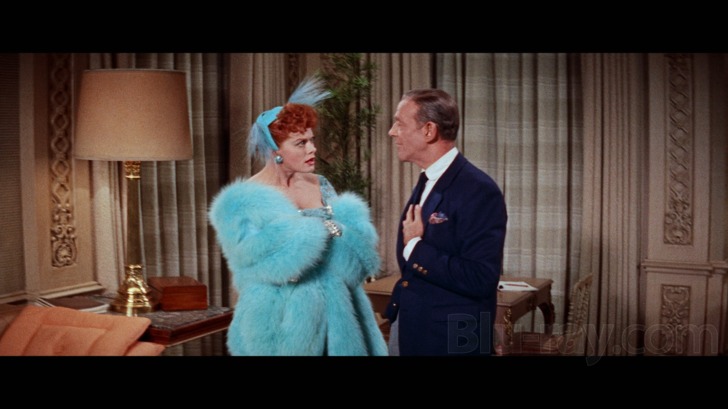
Silk Stockings' original stereo soundtrack was remixed in 5.1 for DVD, and that same mix is presented here in lossless DTS-HD MA. As one might expect, given the source, stereo separation is strongly defined, spreading the instruments of the unseen orchestra across the front of the room. The rear channels have been used conservatively, e.g., to add a humorous echo to the title phrase in the song "Stereophonic Sound". Singing has the artificial character of pre-recorded performances dubbed into the mix, but this quality is inherent to the source. Fidelity is excellent, and dynamic range is good. Incidental scoring was provided by a Conrad Salinger (The Band Wagon), who, despite what IMDb claims, is prominently credited.
Silk Stockings Blu-ray Movie, Special Features and Extras 
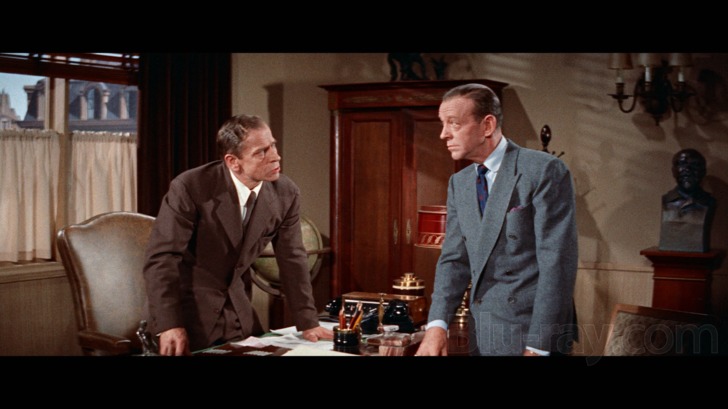
The extras have been ported over from Warner's 2003 DVD of Silk Stockings. The trailer and the
two shorts have been remastered in 1080p.
- Cole Porter in Hollywood: Satin and Silk (480i; 1.33:1; 10:01): This featurette on the making of Silk Stockings was produced by Turner Entertainment in 2003. Its chief attraction is host Cyd Charisse, who says that Ninotchka remains her favorite role. Interviewees include Andre Previn (who was the film's conductor and music supervisor) and Janis Paige.
- Paree, Paree (1080p; 1.37:1; 20:53): This 1934 Vitaphone short starring Dorothy Stone and Bob Hope features songs by Cole Porter.
- Poet and Peasant Overture (1080p; 2.55:1; 9:07): A 1955 short showcasing a performance by the MGM Symphony Orchestra and presented in glorious Metrocolor, breathtaking Cinemascope and stereophonic sound.
- Theatrical Trailer (1080p; 2.35:1; 2:57): Note how the trailer omits the Soviet connection, making the story about "a playboy in Paris looking for a playmate".
Silk Stockings Blu-ray Movie, Overall Score and Recommendation 
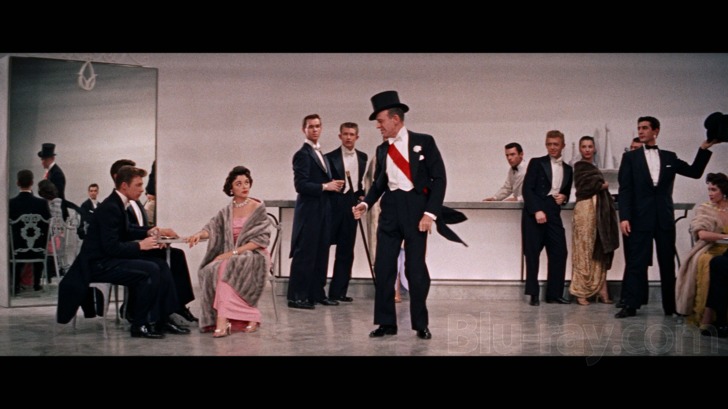
MGM would continue to produce musicals after Silk Stockings, but it and Funny Face (released the same year and also starring Astaire) are among the last to represent the Dream Machine's
classic style. The Blu-ray image is less than optimal, but the film will probably never look better.
Buyer's choice.
Similar titles
Similar titles you might also like

The Band Wagon
1953

On the Town
1949

Victor/Victoria
1982

Singin' in the Rain 4K
70th Anniversary Edition
1952

Cover Girl
Limited Edition to 3000 - SOLD OUT
1944

Daddy Long Legs
1955

The Pirate
Warner Archive Collection
1948

Funny Face
1957

What a Way to Go!
1964

An American in Paris
1951

Down to Earth
1947

Gentlemen Prefer Blondes
1953

Strike Up the Band
Warner Archive Collection
1940

Shall We Dance
1937

Bells Are Ringing
Warner Archive Collection
1960

Ziegfeld Girl
Warner Archive Collection
1941

Mother Wore Tights
Limited Edition
1947

Guys and Dolls
Warner Archive Collection
1955

Flower Drum Song
1961

Viva Las Vegas
50th Anniversary
1964